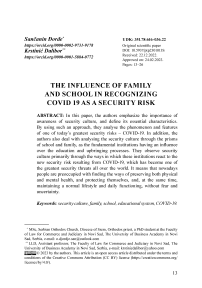The influence of family and school in recognizing Covid 19 as a security risk
Автор: Đorđe Sančanin, Dalibor Krstinić
Журнал: Pravo - teorija i praksa @pravni-fakultet
Рубрика: Original scientific work
Статья в выпуске: 1 vol.40, 2023 года.
Бесплатный доступ
In this paper, the authors emphasize the importance of awareness of security culture, and define its essential characteristics. By using such an approach, they analyse the phenomenon and features of one of today’s greatest security risks – COVID-19. In addition, the authors also deal with analysing the security culture through the prisms of school and family, as the fundamental institutions having an influence over the education and upbringing processes. They observe security culture primarily through the ways in which these institutions react to the new security risk resulting from COVID-19, which has become one of the greatest security threats all over the world. It means that nowadays people are preoccupied with finding the ways of preserving both physical and mental health, and protecting themselves, and, at the same time, maintaining a normal lifestyle and daily functioning, without fear and uncertainty.
Security culture, family, school, educational system, COVID-19
Короткий адрес: https://sciup.org/170202153
IDR: 170202153 | УДК: 351.78:616‑036.22 | DOI: 10.5937/ptp2301013S
Список литературы The influence of family and school in recognizing Covid 19 as a security risk
- Bjelajac, Ž. (2019). Relevantnost introdukcije bezbednosne kulture u obrazovni sistem Republike Srbije [The relevance of the introduction of security culture in the education system of the Republic of Serbia] Kultura polisa, 16(40), pp. 231–244
- Bjelajac, Ž. (2017). Bezbednosna kultura: umeće življenja [Security culture: the art of living]. Novi Sad: Pravni fakultet za privredu i pravosuđe
- Britvić, D. (2020). Grupna analiza u vrijeme pandemije bolesti COVID-19 [Group analysis during the COVID-19 pandemic]. Psihoterapija, 34(1), pp. 148-169
- Vilijams, P. (2012). Uvod u studije bezbednosti [Introduction to security studies]. Beograd: Službeni glasnik
- Vasilj, I., & Ljevak, I. (2020). Epidemiološke karakteristike Covid-a 19 [Epidemiological characteristics of Covid-19]. Zdravstveni glasnik, 6(1), pp. 9–18
- Gidens, E. (2007). Socologija [Sociology]. Beograd: Ekonomski fakultet
- Đorđević, O. (1989). Leksikon bezbednosti [Security lexicon]. Beograd: Privreda publik
- Đorđević, Ž. (2006). Sociologija [Sociology]. Novi Sad: Cekom books
- Zuković, S. (2012). Porodica kao sistem: funkcionalnost i resursi osnaživanja [The family as a system: functionality and empowerment resources]. Novi Sad: Pedagoško društvo Srbije
- Zuković, S. (2012). Odnos između porodice i škole: od saradnika ka partnerstvu [The relationship between family and school: from collaborators to partnership]. U: Gajić, O. (ured.), Kvalitet obrazovnog sistema Srbije u evropskoj perspektivi: zbornik radova: Knj. 2 [The quality of the education system of Serbia in the European perspective: collection of works: Vol. 2]. (pp. 219–230). Novi Sad: Filozofski fakultet
- Injac, O. (2016). Bezbjednosne studije i kultura bezbjednosti [Security studies and security culture]. Beograd: Fakultet političkih nauka Univerziteta u Beogradu; Čigoja štampa
- Miletić, S. (1997). Policijsko pravo [Police law]. Beograd: Policijska akademija
- Miloš, D., & Nezirević, E. (2020). Grad Poreč: Mentalno zdravlje u doba COVID epidemije [Mental health in the age of the COVID epidemic]. Epoha zdravlja: glasilo Hrvatske mreže zdravih gradova 13(1), pp. 9-11
- Mustafa, N. (2020). Impact of the 2019–20 coronavirus pandemic on education. International Journal of Health Preferences Research, 1–12. DOI: 10.13140/RG.2.2.27946.98245
- Počuča, M., & Šarkić, N. (2019). Porodično pravo i porodičnopravna zaštita [Family law and family law protection]. Beograd: JP Službeni glasnik; Pravni fakultet Univerziteta Union
- Počuča, M., & Krstinić, D. (2020). Značaj funkcionalne i odgovorne porodice za vreme pandemije Covid 19 [The importance of a functional and responsible family during the Covid 19 pandemic]. Kultura polisa: posebno izdanje, pp. 167–178
- Počuča, M. (2018). Uloga porodice i škole u afirmaciji bezbednosne kulture [The role of family and school in the affirmation of safety culture]. Kultura polisa, 14(3), pp. 119–131
- Potonjak, N., & Šimleš, P., (Eds.). (1989). Pedagoška enciklopedija [Pedagogical encyclopedia]. Beograd: Zavod za udžbenike i nastavna sredstva
- Peitl, V., Golubić Zatezalo, V., & Karlović, D. (2020). Mental health issues and psychological crisis interventions during the COVID-19 pandemic and earthquakes in Croatia. Archives of psychiatry research 56(2), pp. 193-198, DOI: 10.20471/dec.2020.56.02.07
- Stajić, Lj. (2011). Osnovi bezbednosti sa osnovama istraživanja bezbednosnih pojava [The basics of security with the basics of security phenomenon research]. Novi Sad: Pravni fakultet
- Stajić Lj., Mijajlović, S. & Stanarević, S. (2013). Bezbednosna kultura [Security culture]. Novi Sad: Pravni fakultet
- Stepanović, S. (2020). Uticaj pandemije virusa korona na obrazovanje [The impact of the corona virus pandemic on education]. Nastava i vaspitanje, 69 (2), pp. 183-196
- Skitarelić, N., Dželalija, B. & Skitarelić, N. (2020). Covid-19 pandemija: kratki pregled dosadašnjih spoznaja. [The Covid-19 pandemic: a brief overview of current knowledge.]. Medica Jadertina 50 (1), pp. 5–8
- Truog, R. D., Mitchell, C., & Daley, G., Q. (2020). The toughest triageallocating ventilators in a pandemic. New England Journal of Medicine 382(21), pp. 1973-1975
- Williams, P., D. (2008). Security studies. London & New York: Routledge
- Conception de la sécurité, Série d`études 14, Publication des Nations Unise, 1986, A/40/533


